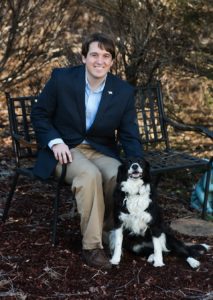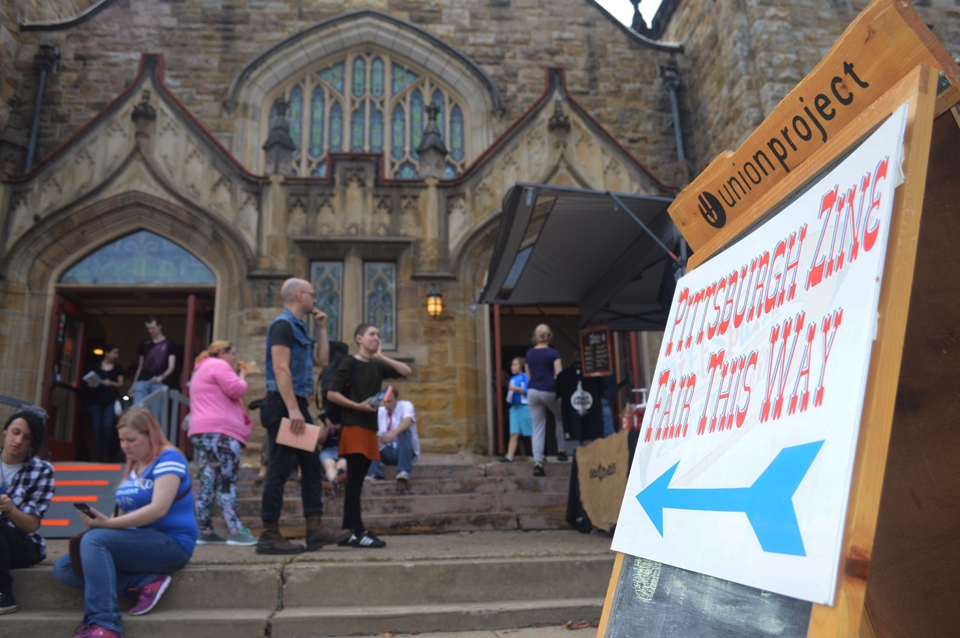
Pavlecic is only 20, but he has announced his candidacy for the 30th Legislative District.
Raymond Arke | News Editor
02/01/18
Many students vote and follow the news, and some wish to be a real part of the political process. For one University of Pittsburgh student, he’s following through on that wish.
Jacob Pavlecic, a 20-year-old junior at Pitt majoring in politics and philosophy and with minors in finance and French, has announced he is running for the 30th District in the Pennsylvania House of Representatives in the Democratic primary. The 30th District consists of Hampton Township, Richland Township, the borough of Fox Chapel and parts of O’Hara and Shaler Townships, according to the Pennsylvania Department of State.
Pavlecic credited the idea of running for state office to his best friend.
“After the 2016 election we were chatting and he said, ‘This is crazy what’s going on right now, I can’t believe it,’” Pavlecic recounted. “‘Why couldn’t our school do something with politics, if they try hard enough.’”
That suggestion stayed in Pavlecic’s mind.
“I don’t know how serious he was at the time, but it stuck with me,” he said. “I’ve always cared deeply about politics. I care deeply about policy especially, so why not give it a shot.”
Pavlecic said that his motivations for running have nothing to do with the incumbent, State Rep. Hal English (R-30), but rather because he just wants to “run for this office.”
“If I win the primary I’ll hopefully be facing Hal English. He’s a nice guy, he called me when I got my Eagle Scout in the district,” he said. “I have several ideological differences from him, but he is a nice guy. I do have respect for him.”
Pavlecic described three big policy proposals that form his platform: balancing the state budget, reforming the occupational licensing system and controlling healthcare costs. He addressed the budget first, which he calls “a mess.”
“This upcoming fiscal year, Pennsylvania is projected to have a $1 billion deficit and in the next couple years that shoots up to $2 billion,” he said.
The process has to change or the state faces credit downgrades which could impact funding for schools and other state programs, Pavlecic warned.
“We have some hard choices there,” he said.
Another issue he cares a lot about is reforming the way the state occupational boards work, something Gov. Tom Wolf has already launched a task force addressing. These boards “determine who can be a surgeon, who can be doctor and you need to make sure your surgeon is qualified to do his job,” Pavlecic said.
However, Pavlecic criticized the unequal amount of hours required for different careers.
“In PA, you need about 1,250 hours to become a certified barber, and you need 120 hours to become an EMT,” he said.
According to the Pennsylvania Department of Health, to be certified as a Emergency Medical Responder requires 48-52 hours and to become an EMT requires 150-200 hours. The State Board of Barber Examiners confirmed that to become a licensed barber, a participant must spend 1,250 hours under a licensed barber teacher.
Fixing this board system is a place where he sees an opportunity for bipartisanship.
“I think that’s an area I can work with Republicans to try and get rid of some of these regulations to make it easier to jump into business or increase reciprocity agreements with other states, so if you move here from a different state and you’re qualified to do your job, you can still do it here,” Pavlecic said.
His third talking point involves trying to find a way for the state to control healthcare prices, something he regrets the state does not have more power over.
“Unfortunately, we are limited in what we can do at the state level. I’d love to import drugs from Canada or the European Union, but that just is not a state level decision,” Pavlecic said.
One way to help the problem is by making the costs transparent.
“Right now you go to a hospital or ER or an urgent care and they don’t have to tell you how much they’re going to charge for you to get treated, which is insane,” he said. “You have no idea what it’s going to be.
“What I would like to do is create a state-maintained database that has the most expensive charges for different common procedures, so people could go online, compare prices and use free-market power to restrain healthcare costs,” Pavlecic said. “I think it would have bipartisan support.”
As a current college student, Pavlecic also lists lowering the cost of college as a “personal goal.”
“One thing I would like to do with balancing the budget is go to these universities’ presidents and say what could we do to get a full tuition freeze, and I mean everything — room and board and all these extra fees — and freeze it for five years,” he said. “I think this is something that would have a real impact and if you could keep doing that every five years, every passing year college becomes more affordable.”
Pavlecic is aware that many people may be skeptical due to his age. But, he views it as an asset.
“I wonder with the state legislature, if any of them have taken the Keystone Exam or PSSA before? I have actually taken those tests,” he said. “I see exactly what the budget cuts do, what state-mandated standards do.”
He asked those who might question his abilities to give him a fair shake first.
“Just keep an open mind and give me a chance. Let me earn your vote … give me a fair shot to see where I stand to show you that I’ve done the research,” Pavlecic said.
So far, this has been a learning experience for Pavlecic as he has navigated local politics. Luckily, he had a helpful connection.
“A big help for me is my mom [who] is a local vice chair of the local Democratic committee,” he said.
Right now, Pavlecic is preparing to start circulating a petition to collect signatures to get on the ballot.
“I’m gearing up right now, trying to find volunteers to circulate petitions and get ready to get as many signatures as I can to get on the ballot,” Pavlecic said.
The petitioning is only the second worst part, according to Pavlecic. The worst, for him, is fundraising.
“[Fundraising is] just trying to go around and begging people for money … You feel really awkward,” Pavlecic said.
Other than the campaign and school, Pavlecic is involved in other activities. He writes for the Pitt Political Review, which he said is the school’s nonpartisan political journal, and he still referees local hockey games as a job.
He also wanted to encourage students to pay attention and get involved in politics, in any way.
“If you want to complain about government, but you don’t vote, then stop complaining. Because this is how you have the opportunity to change it. That’s the bare minimum,” he said.


